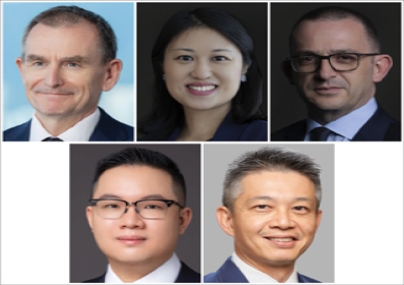
Are virtual law firms the next big thing? Since the COVID-19 pandemic and rise of flexible working, discussions around what the law firm of the future looks like are intensifying, and distributed firms are being offered as a compelling model. In this roundtable, leaders of such firms offer a compelling argument for office-less practices.
ALB: How does the running of a virtual law firm differ from that of a traditional law firm? As managing partner, what does the average day look like for you?
Michael Pierson, managing partner, global corporate, FisherBroyles: From a client’s perspective, our law firm operates quite similarly to other peer firms of our size: We are built to enable our partners to focus only on delivering superior legal services. During the COVID-19 pandemic, all law firms were forced to adopt a remote model, which our firm pioneered 20 years ago. I suspect that the biggest difference is in our constitution.
We were specifically purpose-built as a decentralised, semi-autonomous technology-enabled firm that enables us to manage a distributed partnership from anywhere. Our formula-based compensation model allows us to manage a large, Am Law 200 firm more efficiently and effectively than others. With very lean management and a focus on applying bright-line rules, the lack of discretion in our compensation model means that our firm seeks to treat our lawyers fairly and without bias.
Like most senior leaders of large organisations, my day can be spent setting strategy and communicating messaging, reviewing financials, executing growth initiatives, interacting with the executive committee, and speaking with my practice group leaders.
However, it can also involve meeting new partner candidates, speaking with fellow partners, running firmwide partnership meetings, and practicing securities law for our many clients. Most of all, my role involves making decisions that further the growth of the partnership, challenging and empowering our people to make great decisions, and problem-solving by allocating and deploying our talent. Above all, I strive to lead by example and to strike a positive tone.
David Reidy, managing partner, Scale: We think of ourselves as a modern firm operating on a distributed platform. Because of the flexibility of our model, we can compete for the best talent in the country–and that’s the managing partner’s first job, to find the best people.
Grant Walsh, co-founder and co-managing partner, Culhane Meadows: Running a remote-office law firm has many of the same duties and responsibilities as a traditional law firm—we’re managing both our own practices, making sure that the firm is functioning well and that our partners are being supported, and that our clients are happy.
The difference comes in how you build and maintain the culture within a distributed environment and, for us, the culture itself which is deliberately distinct from that of a traditional firm. A big part of that is bringing in attorneys who want to do things in a new and more efficient way, as well as having the technology in place to allow partners to work seamlessly with colleagues and clients from anywhere.
As for my day-to-day work, we divide up much of the operational and management duties between the five members of our leadership team. My work focuses on marketing, relationships, and recruitment, which means that I’m meeting with partners and prospective partners on a regular basis—and supporting my colleagues in their client development initiatives, too.
That means that I do a lot of travelling, but because I work from my home office most of the time, I also get to be a big part of my kids’ lives on a regular basis. So, I may be across the country meeting a prospect early in the week, but be home to take my youngest to school and attend a soccer game with one of my older kids later in week. Having a work-life balance is really all about being able to take care of the most important thing at that moment, whether it’s spending extra time with one of my kids after they had a rough day at school, or saying good night early so that I can go tackle some urgent work e-mails once the kids are in bed. I’ve found that having the ability to integrate my work and home life gives me the ability to be better at both.
ALB: In what ways do your priorities differ from leaders of traditional law firms?
Reidy: We do not struggle with the high turnover and retention issues facing traditional firms. This allows us to focus on strategic growth, and on building teams to strengthen client relationships.
Walsh: Our entire leadership team is much more focused on the needs of our clients and our partners. We don’t have the overhead of a traditional firm and that financial freedom means that we’re not pressuring our partners to bill a ton of hours to meet quotas, or raising our client rates every year. In fact, we operate more like a modern business, with a technology-forward approach and an emphasis on efficiency and value.
Another key difference is that we prioritise collaboration not competition. Many traditional firms have a culture that pits attorneys against each other for client origination or to increase profits for the firm. We think that working together is a superior way to serve our clients, and it’s a much nicer atmosphere to work in.
Pierson: Our firm does not have billable quotas, so we are free to focus on excellence and client service, responding to partner feedback, improving our firm experience, and continuing to build the next-generation law firm.
ALB: What are some common misconceptions about virtual law firms among clients as well as lawyers in private practice?
Reidy: The secret’s out about distributed firms. In the past, some clients may have wondered if the bench strength was there, in terms of staffing deals and litigation, but clients have embraced our model because of the quality of our team and the value that we bring as former GCs and business owners ourselves. On the talent side, lawyers who are accustomed to handing over 60 to 70 percent of their value to a traditional law firm have realised they can build a more rewarding practice, with better economics, at Scale.
Pierson: We are often asked whether we are several hundred mini practices under one common umbrella. Nothing could be further from reality. Our lawyers often practice in teams, and our guidance is consensus-driven by current law and up-to-date market norms. I often say that under the hood, we look and feels a lot like the large, global law firms where many of us practiced previously.
Walsh: The word “virtual” implies something that’s not real, but Culhane Meadows is a very real national law firm with about 70 real lawyers who serve over 700 real clients. That’s why we prefer more accurate terminology like remote, cloud-based, distributed, alternative model, or non-traditional to describe our firm.
At the very beginning of work-from-home in spring 2020, there were a lot of articles about people working in their pajamas, suggesting a less-than- professional standard. However, Culhane Meadows was formed and launched from Day One to be a distributed law firm that reduces overhead, provides clients with an exceptional value proposition, and affords greater work-life balance for our attorneys.
Since then, we’ve found that our clients are similarly way ahead of traditional law firms in recognising the benefits of leveraging remote-work technology. Many of our clients have also adopted a digital workplace—even before COVID—and prefer the efficiency and flexibility that it offers. So, in our experience, there hasn’t been a lot of resistance to the concept of remote work from clients.
Not having an office to go to can be a harder concept for attorneys to grasp, especially if they’ve not been working with the technological tools that we’ve embraced.
We do a lot of one-on-one work with our new partners during onboarding to help them quickly feel comfort-able working remotely from their home office. Those tools also allow them to collaborate with other partners as easily (or more!) than if they were working down the hall from each other in a traditional brick-and-mortar firm.
Partners also see very early on that the “water-cooler” aspects of working in an office don’t disappear in a remote workplace. We have brown-bag lunches over video conference, movie nights and our partners form great relationships even though they might work across the country from their colleagues. Plus, we hold monthly in-person meetings, lunches and happy hours with our partners in each of our 11 business markets, and a four-day partner retreat in a fun destination once per year.
ALB: How is the experience different from a client’s perspective, and what kind of feedback do you receive from clients?
Pierson: Since we have eliminated a number of overhead expenses — including real estate — our clients like that our work is partner-led at rates that are often two-thirds of our competitors. Many clients do not realise that we maintain zero physical offices.
Walsh: For most of our clients, the experience isn’t any different as we work with clients in almost all of the same ways that traditional firms do. For example, if the clients want to meet, instead of hosting them we might travel to their offices, or rent out a conference room for the day. As you can imagine, during the pandemic these small differences have been pretty insignificant.
Clients are really focused on outcomes, and we’ve learned that as long as we’re getting the work done, they don’t care about how or when that work happens. And they appreciate the efficiency and value that our non-traditional firm delivers.
Reidy: Clients are rooting for us. The Big Law salary wars provide a headline, but the real story there is turnover. The Georgetown/Reuters 2022 Report on the State of the Legal Market found that higher salaries are not increasing retention, with some firms losing a quarter of their associates just last year. Clients understand that this does not serve their interests. They see the lack of training and experience that results from the churn, and they see the rates firms have to charge to play the game. Our clients are glad Scale and other distributed firms can offer an alternative, and they know that most of our attorneys have worked in-house or served in a GC role. They know we get it.
ALB: Who is a good fit for a virtual law firm, and what kind of attributes or experience should they possess?
Reidy: We look for character, quality and experience. We receive hundreds of applications every month, and so we focus on entrepreneurial and collaborative people who are ready to reimagine the practice of law and understand that clients deserve better. Our top-tier brand allows us to focus on attorneys with the best training and credentials. And finally, we look for experience that’s relevant to our clients – whether at a prior firm, as a tech company GC, former prosecutor, or startup founder. It’s a big tent, but the common thread is experience that helps us relate to the challenges and opportunities facing our clients.
Walsh: Our partners are experienced attorneys with at least eight years of practice in-house at a large corporation or at a Big Law firm. They know their clients, their practice area and the market they work within, and have established a book of business.
Beyond that, what we look for is someone who is a good fit with our collegial culture and is looking for a change in how, when and where they work. We encourage collaboration and want partners who are eager to work with their colleagues and enjoy the benefits of a supportive and diverse environment.
Pierson: Not all firms with our model are the same so I can only speak to our standards. We have very specific hiring criteria, and all our partners are extraordinarily well-trained. Most join us with more than 10 years of experience gained in an Am Law 100 firm, large corporate department, or government agency. Most of our partners have a healthy dose of entrepreneurial spirit, and all are driven to practice at the highest level of the profession. Elite lawyers with books of business perform exceptionally well at our firm.
ALB: In terms of hiring, what do you do to attract the talent you want? Do you face challenges in terms of the novel nature of your operations?
Reidy: We attract talent by treating our lawyers as clients. We have built a firm that allows each attorney to pursue high-quality work with great clients, on a flexible and tech-enabled platform. As a result, we are inundated with interest in the firm, and we can recruit in a way that serves our strategic plan, tech brand, and market position.
Walsh: It was harder before COVID. The pandemic has shown attorneys that they can still work at the top level without having to be in the office, and many people found that they could also have a better work/life balance working remotely. So, attorneys reluctant to move to a distributed firm previously now have proof of concept that it will work for them.
Attracting talent for us is really about getting the word out about who we are and how we operate. Many of our attorneys come to us because they’ve worked with one of our partners and have seen the benefits of our business model first-hand.
We also work with recruiters, especially in an effort to reach women and other minority attorneys. Although recruitment at traditional firms is improving for diverse attorneys at the beginning of their careers, those numbers decrease steadily as attorneys progress. That means that there are fewer women and minority attorneys who have the experience we look for. Working with recruiters and being active members of organisations like the National Association of Minority and Women-owned Law Firms (NAMWOLF) and Women-Owned Law (WOL) help us to connect with a more diverse pool of experienced attorneys who might appreciate the unique appeal of Culhane Meadows, where every attorney is treated on a completely level playing field, regardless of race, gender, orientation, or background.
Pierson: Unbound by geography, we seek to attract the brightest legal minds wherever they happen to live. Due to our unparalleled compensation model, we are able to recruit partners with significant books of business who often earn much more at our firm. In addition to rainmakers, we are especially attractive for working parents, lawyers of diverse backgrounds, and anyone interested in working at a true meritocratic organisation.
ALB: Looking ahead to the future, how do you see the legal industry evolving, and what role will virtual firms play in that?
Walsh: In the U.S. we’re experiencing “The Great Resignation” as the tumult of the pandemic and other world events have changed how people feel about work. For attorneys, the pandemic has shown that they can practice sophisticated law without spending 70 hours a week at the office. I don’t think that attorneys are willing to go back to what life was like pre-pandemic, and this is born out, especially in how the younger generations are approaching their legal careers. We’re seeing many firms offer more flexibility or a hybrid model of work to keep and attract attorneys.
Of course, Culhane Meadows has offered that kind of flexibility ever since we began operations almost a decade ago. Hopefully, these changes in how they work will inspire change in the culture of the legal workplace, too. Research shows that a healthier, more diverse workplace leads to better outcomes for clients, attorneys and the firm. Yet too few traditional firms have been willing to make the systemic changes needed—like offering permanent remote work options—to create real change. It can be done, and cloud-based firms like Culhane Meadows will continue to show the way.
Pierson: I believe the term “virtual” will no longer be necessary (indeed, we refer to our firm as a distributed law firm). Lawyers should be free to serve clients from anywhere, utilise technology to interact with their colleagues and clients, and choose in-person meetings when they deem it essential. This is the beginning of a golden era for law firms able to effectively manage a distributed workforce using technology, and I believe our firm is leading the way.
Reidy: We believe there will be an entire sector of distributed firms that offer better economics and flexibility for attorneys, and a better value proposition for clients. Big firms are not going away, but there are thousands of lawyers - and countless clients - excited to see the legal profession finally accept modernisation. We are proud to be at the forefront of that change. There’s no question in my mind that Scale will be a power-house firm.
バーチャル法律事務所、リアルな意気込み
バーチャル法律事務所は次のメガ・トレンドになるのか。新型コロナウイルス感染症の世界的流行と、これを発端に浸透してきたフレキシブルな勤務体制を背景に、世界では未来の法律事務所のあり方をめぐって活発な議論が交わされており、分散型事務所が有力なモデルとして登場している。このラウンド・テーブルでは、分散型法律事務所の経営者たちが、物理的な事務所を持たない事業形態の利点について、説得力のある議論を展開した。
ALB:バーチャル法律事務所の経営は、従来型の法律事務所とどう違うのでしょうか。マネージング・パートナーとして、普段はどのような1日を過ごしていますか。
マイケル・ピアソン弁護士(MICHAEL PIERSON、フィッシャー・ブロイレス法律事務所/グローバルコーポレート部門マネージング・パートナー):クライアントの視点から見 れ ば、フィッシャー・ブロイレスは同規模の法律事務所とまったく同じように運営されています。私共は、所属するパートナーが優れた法務サービスを提供することだけに力を入れることがきるような体制を整えているのです。新型コロナ流行下で、すべての法律事務所はリモートワークを導入せざるを得ませんでしたが、弊所は既に20年前からそうした事業形態でした。フィッシャー・ブロイレスと他の法律事務所の最大の違いは、私共の組織構造にあると思います。
弊所は、各地に分散したパートナーをどこからでも管理できるテクノロジーを駆使した分散型・半自律型の法律事務所として、特別な目的のもとに設立され、全米法律事務所ランキング・トップ200(Am Law 200)にランクインする大規模な法律事務所へと成長しましたが、特定の報酬モデルを採用することで、他の事務所よりも効率的かつ効果的な運営を行っています。無駄を削ぎ落とした経営と明瞭なルールの適用とともに、報酬モデルから裁量を除外したことは、偏りなく公正に弁護士を扱おうという弊所の姿勢を示すものです。
大きな組織の上層と同様、私の1日の業務内容は、戦略の策定とメッセージの伝達、財務状況の確認、成長戦略の実行、取締役会とのやり取り、そしてプラクティス・グループのリーダーとの話し合いなどです。
また、新しいパートナー候補の面接、同僚パートナーとのコミュニケーション、全体のパートナー会議のほか、多くのクライアントのために証券取引法の実務も担当しています。私の役割は何と言っても、パートナーシップを促進するための意思決定と、弁護士と職員が優れた意思決定をできるよう意欲を掻き立てて実権を与えること、そして人材の適材適所を通じた問題解決です。何よりも、率先垂範して、前向きな姿を見せることを心がけています。
デイビッド・リーディ弁護士(DAVID REIDY、スケール法律事務所/マネージング・パートナー):私共は、自らを分散型プラットフォームで運営される現代的な法律事務所だと考えています。弊所のモデルは柔軟性に富んでいるので、国内で最も優秀な人材を獲得することができます。優秀な人材の発掘こそ、マネージング・パートナーの最も重要な責務です。
グラント・ウォルシュ弁護士(GRANT WALSH、カルヘン・メドウズ法律事務所/共同創業者兼共同マネージング・パートナー):リモートで法律事務所を運営することは、従来の法律事務所と同じように多くの義務や責任を伴います。業務を管理し、事務所がうまく機能しているか確認するとともに、パートナーへの支援は十分であるか、そしてクライアントが満足しているかどうかを重視します。
従来の法律事務所との違いは、分散型環境の中でどのように弊所ならではの文化を築き維持するかにあります。弊所では意図的に、従来型の法律事務所とは異なる文化を築いています。そのためにも、より効率的で斬新な方法で物事を進めたいと考えている弁護士を招き、パートナーがどこからでも同僚やクライアントとシームレスに仕事ができるようテクノロジーを導入することが、大きなポイントです。
普段は、5人の経営陣で運営と管理の大部分を分担しています。私の仕事はマーケティング、リレーションシップ、採用が中心で、パートナーとの面談やパートナ ー候補の面接を定期的にこなし、同僚の新規顧客開拓の取り組みを支援することです。
従って出張が多いのですが、それ以外はほとんど自宅で仕事をしており、普段は子供たちの生活にしっかりと関わることができます。週の前半に国を横断して見込み顧客と会議をしても、週の後半には家に帰って末っ子の学校への送り迎えや上の子のサッカーの試合観戦もできるのです。ワークライフバランスを保つには、その時々に最も重要なことに取り組むことが大切です。例えば、子供が学校でたいへんな1日を過ごした場合は一緒にいる時間を増やしたり、子供を早めに寝かしつけて急ぎの仕事のメールに対処したりすることができます。仕事と家庭の調和を保つことで、両方でより高い能力を発揮できるのです。
ALB:ご自身の優先順位は、従来の法律事務所の経営者とはどのように違うのでしょうか。
リーディ弁護士:弊所は、従来の法律事務所が抱えている高い離職率や定着率の問題に悩まされることはありません。そのため、戦略的成長とクライアントとの関係強化に焦点を当てたチーム構築に集中することができます。
ウォルシュ弁護士:弊所の経営陣は、クライアントやパートナーのニーズをより重視しています。弊所では、(家賃といった)従来の法律事務所でかかる諸経費が不要で、財務的な自由があるため、パートナーに対してノルマ達成のために非常に長い相談時間を請求するようプレッシャーをかけたり、クライアントの相談費用を毎年引き上げたりするようなことはありません。事実、私共は最先端のテクノロジーを採用することで、効率性と価値を重視した最先端の運営をしています。
もう一つの大きな違いは、弊所は競
争ではなく協力を優先していることです。伝統的な形態の法律事務所の多くには、顧客開拓のため、あるいは利益を上げるために、弁護士を互いに競わせる文化が根付いています。しかし、私共は協力し合うことこそ、クライアントに貢献できる優れた方法だと考えますし、協力すればより良い雰囲気の中で仕事に取り組むことができます。
ピアソン弁護士:弊所はノルマを設けていません。そのため、レベルの高い顧客サ ービスに集中するとともに、パートナーから寄せられるフィードバックに対応して事務所全体で経験を積み上げて改善し、今後も次世代型の法律事務所を構築し続けることができるのです。
ALB:バーチャル法律事務所について、クラ イアントや個人で開業している弁護士が一般的に誤解している点とは、どんなものでしょうか。
リ ーディ弁護士:もはや分散型法律事務所は謎めいたものではなく、広く受容されつつあります。かつてはディールや訴訟を担当する人材配置という点で、「豊富な人的資源を備えているのか」と疑問に思うクライアントもいたかもしれません。しかし、今では、私共のチームの質の高さと、私共自身がゼネラル・カウンセルや経営者を務めた経験がもたらす価値が評価され、クライアントが弊所のビジネスモデルを受け入れてくれています。人材という面でも、従来の法律事務所では、弁護士が自らの売上の60〜70%を納めることが一般的でしたが、現在では、報酬制度がより有利な上、やりがいのある仕事に打ち込めることが弁護士たちにも認識されています。
ピアソン弁護士:私共はよく、「一つの組織の傘下に数百の小さな事務所があるのと変わらないのではないか」と聞かれますが、決してそんなことはありません。弊所の弁護士は、しばしばチーム体制で業務を行い、現行の法律と最新の市場の規範に基づいたコンセンサスのもとで助言を行なっています。弊所には国際的な大手法律事務所で働いた経験のある弁護士が多数いますが、蓋を開ければ、そうした大手事務所と大変似ているのだと、私はよく言っています。
ウォルシュ弁護士:「バーチャル」という言葉は、現実には存在しないような印象を与えますが、カルヘン・メドウズは約70名の所属弁護士が700名以上のクライアントにサービスを提供する、全米展開の非常にリアルな法律事務所です。そういう理由から、「リモート」「クラウド・ベース」「分散型」「代替モデル」「非従来型」等、より正確な用語が適切だと考えています。
2020年春に在宅ワークが普及し始めた当初、多くのメディアはパジャマ姿で働く社員について取り上げ、プロフェッシ ョナルとは言い難い仕事への姿勢を指摘しました。しかし、弊所は設立当初から、弁護士の数を少なくし、経費を低く設定するとともに、クライアントに優れた価値を提供し、弁護士のワークライフバランスを実現する分散型法律事務所としてスタートしています。
それ以降、クライアントも、従来型の法律事務所に比べてリモートワーク技術を活用することの利点をより前向きに理解するようになりました。また、多くのクライアントは新型コロナ発生以前からデジタルワークを導入し、その利便性と柔軟性を既に高く評価していたので、「リモートワーク」という概念にクライアントが抵抗感を示したことは、あまりありません。
ただ、弊所が導入しているようなテクノロジー・ツールを活用したことがない弁護士にとっては、物理的な事務所がないという事実は理解が難しいかもしれません。
弊所は、また、新たに入所するパートナーが自宅でのリモート作業に早く慣れるよう、入所したての頃は、マンツーマンで多くの業務に共に取り組みます。これらのツールを活用すれば、従来の物理的な事務所で働くのと同じように(あるいはそれ以上に)、パートナーたちと簡単に協力することができます。
加えて、パートナーたちは物理的な事務所における「井戸端会議的」な交流がリモートワークに移行してもなくならないことに早くから気付いてくれます。ビデオ会議を利用した昼食会や夜の映画鑑賞会等によって、彼らは全国各地の同僚と親密な関係を築いています。さらに、事業展開する11の市場でパートナーたちと対面式のミーティングを毎月1回行うほか、ランチやハッピーアワーの時間も設けています。また、年に一度は魅力的な観光地で4日間のリトリートを開催し、パートナーが交流を深めています。
ALB:クライアントの視点から見て、バーチャル法律事務所は従来の事務所とどのように違いますか。また、クライアントからはどのようなフィードバックが寄せられていますか。
ピアソン弁護士:弊所では弁護士数や事務所の賃料をはじめ多くの諸経費が不要なため、提供するサービスがパートナー主導である上、費用も競合の3分の2程度であることが、クライアントから好評です。私共が物理的な事務所を持たないことに気付いていないクライアントもかなりいます。
ウォルシュ弁護士:私共は従来の法律事務所と同じ方法でクライアントと仕事に取り組んでいるので、多くのクライアントは何ら違いを感じません。例えば、クライアントが会議を開きたいと望めば、弊所に来ていただく代わりにクライアントのオフィスまで出向いたり、会議室を1日だけレンタルしたりします。ご想像の通り、コロナ下ではこうした些細な点はまったく重視されませんでした。
クライアントが重視しているのは成果であり、私共が仕事をしっかりと成し遂げさえすれば、私共の仕事の進め方や勤務時間にはこだわらないということも学びました。そして、非従来型の法律事務所である弊所が提供する効率性と価値は高く評価されています。
リーディ弁護士:クライアントは私共を応援してくれています。米国の大手法律事務所の給与をめぐる競争はニュースにはな っていますが、実際の問題は離職率です。ジョージタウン大学とロイターがまとめた2022年の法曹界の最新情報によると、給与を引き上げても定着率は向上せず、昨年だけでアソシエイトの4分の1が離職した法律事務所もあるそうです。クライアントは、こうした状況が自分たちの利益につながらないことを理解しています。つまり、高水準の離職を背景に弁護士の訓練不足や経験不足が露呈する一方、こうした状況のもとでは法律事務所が多額の料金を請求しなければならないことを、目の当たりにしているのです。クライアントは、分散型法律事務所が、さまざまな面でこれまでとは違う手段でサービスを提供できることを歓迎しており、弊所の大半の弁護士が社内弁護士やゼネラル・カウンセルを務めた経験があることも知っています。つまり、私共がクライアントのニ ーズを熟知していることを知っているのです。
ALB:バーチャル法律事務所に適しているのは、どのような特性や経験を持つ弁護士ですか。
リーディ弁護士:私 共が求 めるのは、人柄、クオリティ、そして職務経験です。毎月、弊所には数百人の応募が来ます。そうした中、法律業界に新風を吹き込む準備ができていて、クライアントがより良いサ ービスを享受すべきだと考える、起業家精神と協調性を併せ持つ人材を求めています。弊所は業界最大手のブランドなので、最高水準の訓練を受けたトップクラスの弁護士に焦点を絞ることができます。さらに、それまでの法律事務所での経験や、ハイテク企業のゼネラル・カウンセル、元検事、スタートアップ企業の創業者の経験等、クライアントのニーズに合致する経験を求めています。経験の内容は多岐にわたりますが、共通しているのは、クライアントが直面する課題やビジネスチャンスを理解するのに役立つ経験を積んできたかどうかです。
ウォルシュ弁護士:弊所のパートナーは、大企業の法務あるいは大手法律事務所に所属して8年以上の実務経験を積んだベテランばかりです。誰もがクライアント、その事業分野と市場を熟知しており、キャリアを通じて独自に獲得してきたクライアントのリストを持っています。
ただ、それ以上に私共が求めているのは、同僚に対する思いやりを重視する弊所の文化に合う人柄で、仕事のやり方や勤務時間・場所について変革を求めている人です。弊所では協力を推奨しており、同僚と一緒に働き、協力的かつ多様性豊かな環境がもたらすメリットの享受を前向きにとらえるパートナーを求めています。
ピアソン弁護士:バーチャル法律事務所のモデルを採用している事務所がすべて同じというわけではないので、弊所の基準に限定してお話しします。私共は非常に厳しい採用基準を設けており、すべてのパートナーがとても高度な訓練を受けています。入所する弁護士は、ほとんどが全米法律事務所ランキング・トップ100に名を連ねる大手法律事務所や、大企業の法務部、政府機関等で10年以上の経験を積んでいます。また、多くのパートナーは旺盛な起業家精神を持ち、誰もがプロフェ ッショナルとして最高の水準で業務を遂行することに意欲的です。弊所では、キャリアを通じて自分独自のクライアント・リストを築いてきたエリート弁護士が大いに活躍しています。
ALB:採用に関して、欲しい人材を集めるためにどのような工夫をしていますか。また、事業形態が斬新であるという点で問題が生じることはありますか。
リーディ弁護士:私共は、弁護士をもクライアントとして扱うことで、人材を獲得しています。弊所はフレキシブルでテクノロジーを駆使したプラットフォームを導入し、それぞれの弁護士がクライアントへのサービスと品質の高い仕事に打ち込めるような組織を築いています。その結果、大きな注目を浴び、弊所の戦略的計画、テクノロジー重視型のブランド、市場におけるポジションに適した方法で採用を行うことができるようになりました。
ウォルシュ弁護士:新型コロナ発生以前は採用がもっと大変でした。パンデミックによって、実際に事務所にいなくてもトップレベルの仕事ができると判明し、多くの人がリモートワークを通じてより良いワークライフバランスをも実現できることに気付いたのです。これまでは分散型法律事務所で働くことに消極的だった弁護士も、それが実際に有効であるという現実を目にしています。
優秀な人材を集めることは、私共がどのような法律事務所で、どのように活動しているのかを知ってもらうことに他なりません。多くの所属弁護士は、弊所のパートナーと仕事をした経験があり、私共のビジネスモデルの長所を目の当たりにして、入所を決めています。
また、私共はとりわけ、女性やマイノリティの弁護士を獲得するために、リクルーターとも連携しています。伝統的な法律事務所では、キャリアの初期段階にある弁護士について多様性を重視した採用が進んではいますが、キャリアアップするに連れて多様性は確実に減少します。つまり、私共が求めるような経験を積んだ女性やマイノリティの弁護士が少ないのです。弊所はリクルーターと協力し、マイノリティや女性が経営する法律事務所の団体であるNAMWOLF(National Association of Minority and Women-owned Law Firms)やWOL(Women-Owned Law)と協力し、人種、ジェンダ ー、性的指向、その他バックグラウンドにかかわらず、すべての弁護士が完全に公平に扱われるという弊所の魅力を評価してくれる、豊富な経験を持つ多様な弁護士と、つながることができるのです。
ピアソン弁護士:私共は地理的な制約を受けることなく、どこに住んでいようと、最も優秀な弁護士を惹きつけることを目指しています。弊所は競合を凌駕する報酬モデルを採用しているため、非常に厚いクライアント・リストを持つパートナーを迎え入れ、多額の報酬を支払うことができます。また、トップの弁護士だけでなく、育児中の弁護士や多様なバックグラウンドを持つ弁護士、そして真の実力主義組織で働きたいと思う人にとって、弊所は非常に魅力的な存在です。
ALB:将来に向けて、法曹界はどのように進化していくと考えますか。バーチャル法律事務所はどのような役割を担っていくのでしょうか。
ウォルシュ弁護士:コロナの世界的流行やその他のグローバルな出来事が混乱をもたらしたことで、人々の仕事に対する考え方が変化し、米国は「大退職時代」を迎えています。弁護士の場合、パンデミックによって、週70時間も事務所に詰めていなくても高度な法律業務を行えることが、明らかになりました。コロナ以前の業務体制に戻ろうと思う弁護士はいないでし ょうし、こうした姿勢は、特に若い世代における法曹界でのキャリア形成に対するアプローチに顕著に表れています。多くの法律事務所が、弁護士を確保し惹きつけるために、よりフレキシブルな働き方やハイブリッド型の勤務形態を提供しています。
無論、カルヘン・メドウズは、ほぼ10年前の設立当初から、そのような柔軟性を提供してきました。こうした働き方の変革が、法曹界の文化にも変化をもたらすよう願っています。より健全で多様性豊かな職場は、クライアント、弁護士、事務所にとってより良い結果をもたらすという調査結果があります。しかし、従来型の法律事務所は、常時リモートワークを提供するといった、真の変革をもたらすために不可欠な組織全体の変革に積極的ではありません。でも、そうした変革は可能です。弊所のようなクラウド・ベースの法律事務所が、引き続きそれを実証していくことでしょう。
ピアソン弁護士:私は「バーチャル」という言葉はもはやいらないと考えています(事実、私共は弊所を「分散型法律事務所」と呼んでいます)。弁護士には、どこからでもクライアントにサービスを提供し、同僚やクライアントとやり取りするためにテクノロジーを活用し、必要だと判断した場合に直接面談することを選べる自由があるはずです。テクノロジーを駆使し、分散された労働力を効果的に管理する法律事務所の黄金時代が幕を開けたのです。そして、弊所が新しい道を切り開いているのだと確信しています。
リーディ弁護士:今後は分散型法律事務所というセクターが確立され、弁護士により良い報酬制度と柔軟性を提供し、クライアントにはより良い価値を提案できるようになると私共は考えます。大手法律事務所が淘汰されるわけではありませんが、ついに法曹界が現代化を遂げることに、何千人もの弁護士、そして数え切れないほどのクライアントが期待を寄せています。私共は、そのような変革の最前線にいることを誇りに思います。将来、スケールが有力な法律事務所として台頭することに疑問の余地はないと考えています。


